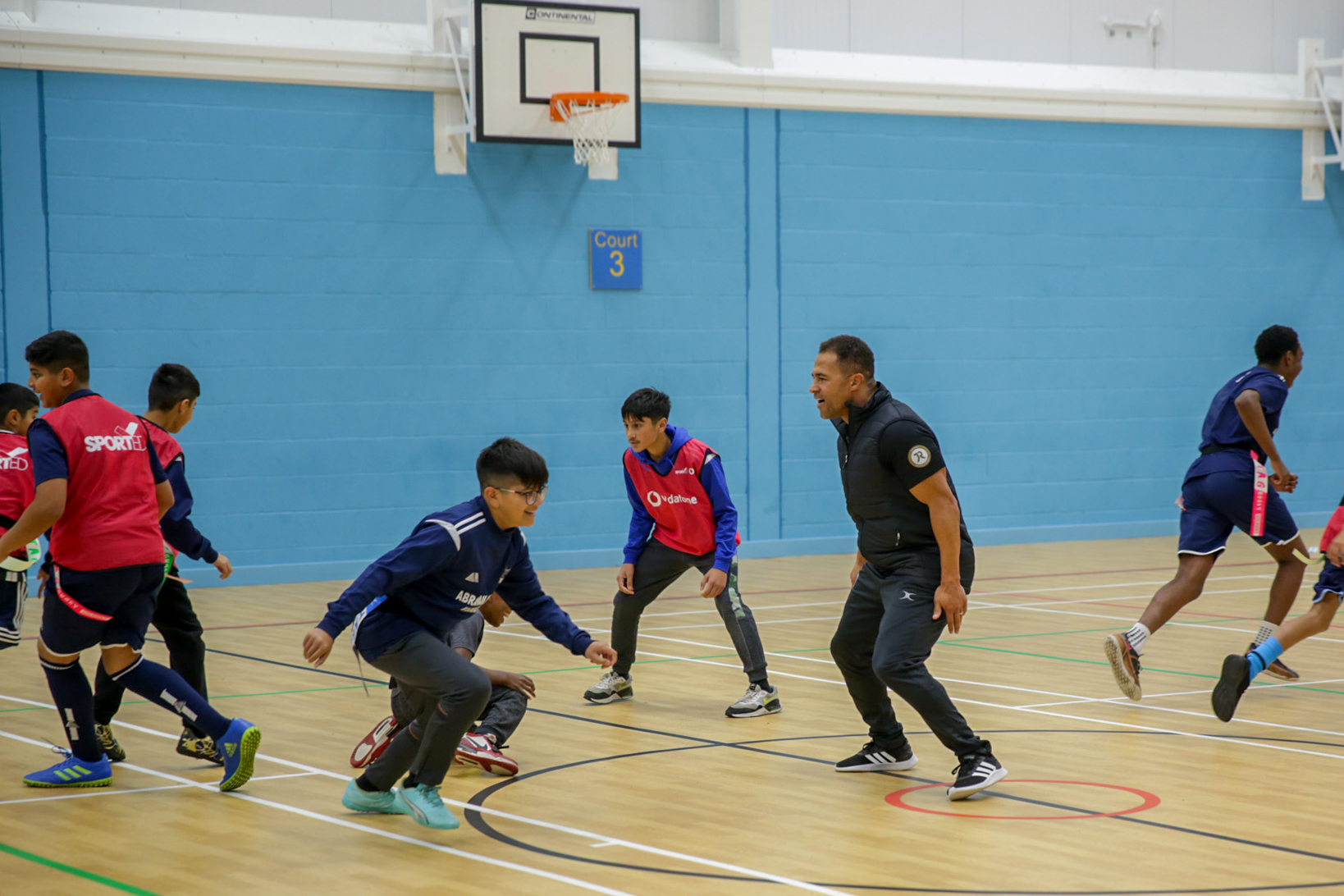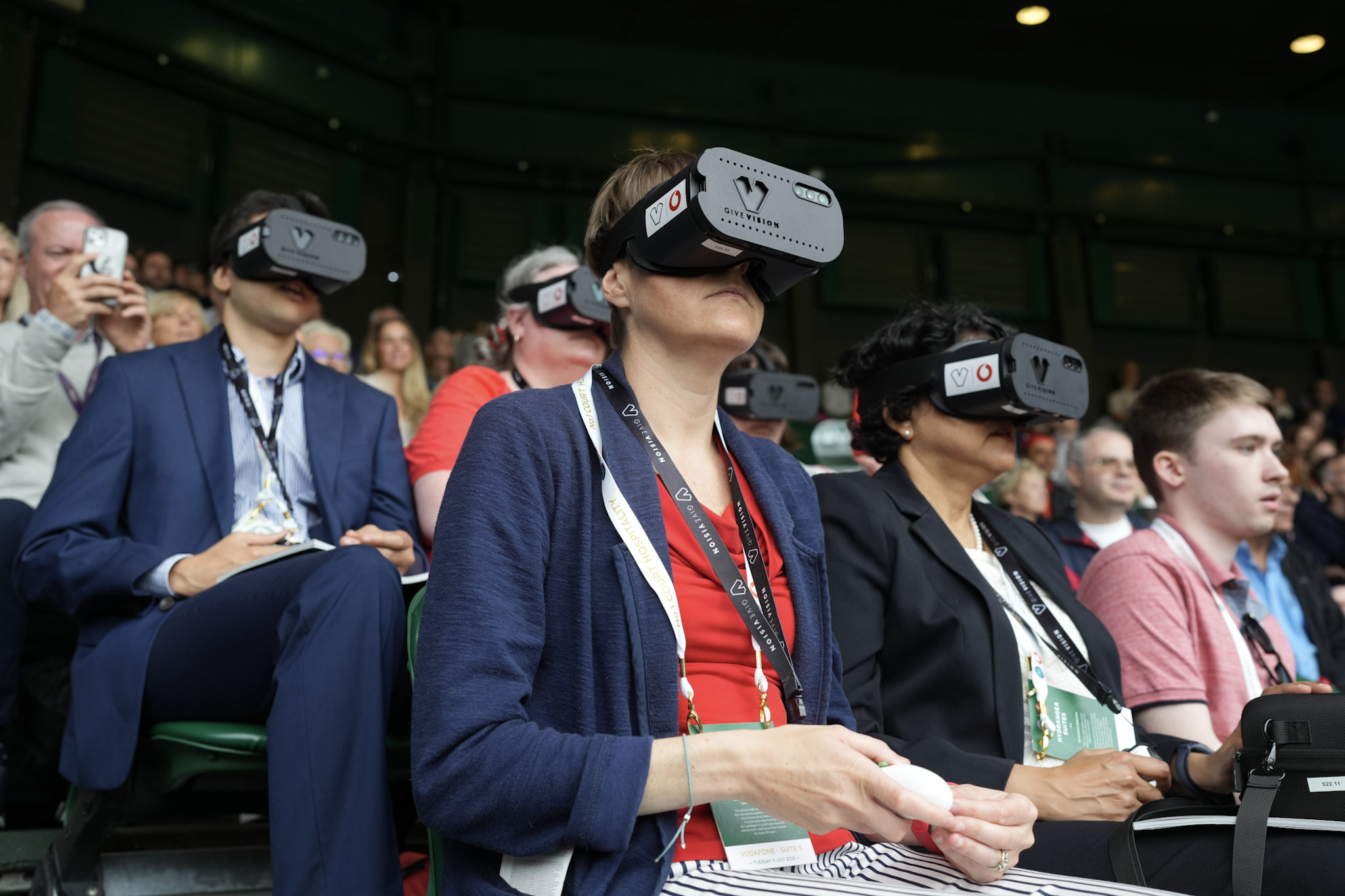From hospitality to ticketing, matchday trade at stadia would benefit from a countrywide 5G SA rollout.
- 5G-powered tech across the UK rugby matchday ecosystem – from hospitality to broadcasting – could add a total of £139 million to the rugby economy per season from 2029, whilst also boosting the fan experience in and outside stadiums.
- Sales of VR ‘seats’ at sold-out rugby matches could generate up to £115 million in annual ticket sales per year from 2029 – a 103% uplift on current ticketing income.
- Thanks to 5G, more efficient food and drinks sales at rugby stadiums could shorten queues and generate an additional £24 million revenue from 2029 – with 30,000 seat stadiums averaging a 42% uplift in food and drink sales.
- The proposed Vodafone and Three UK merger will help to accelerate 5G rollout, with a pledge to invest £11 billion and reach over 99% of the UK population with 5G Standalone by 2034. This would cover the UK’s 120 top sports stadiums and 4,000 grassroots sports facilities and power innovative technology that can supercharge sport.
New modelling by Development Economics has revealed how the accelerated rollout of 5G could play a major role in supercharging British sport – adding much-needed revenue to struggling clubs, as well as enhancing fan experiences and supporting grassroot levels.
Vodafone commissioned the modelling to create The 5G Match Day – an interactive infographic that highlights ways 5G could supercharge sport for professional clubs, fans, and grassroots and professional players. As principal partner of the Welsh Rugby Union and Digital Transformation Partner to the Principality Stadium, Vodafone has recently installed 5G at Cardiff’s iconic sports venue. This gives fans across the venue the best possible experience, supported by a reliable, award-winning network.
The report estimates that up to £139 million could be added to rugby’s match day economy every season from 2029 – a 50% increase. This would come from increases to two major income streams for professional sport – hospitality and ticketing.
Boosting matchday revenues in rugby
5G-enabled monitoring technologies, working in parallel with the Internet of Things (IoT) and the cloud, will enable food and drink vendors in stadiums to monitor customer demand and stock levels, allowing them to serve more customers, more quickly, during busy periods. The research found these technologies, alongside 5G-powered apps that let customers place orders in advance and select items suited to dietary needs, could add nearly £24 million annually to rugby’s match day economy by 2029 – so you can grab a half time beer and a burger without missing any of the action.
And it’s not just rugby. Introducing 5G technologies in a typical 30,000 seat football stadium would result in a 42% uplift in food and drink revenue per fixture – equating to £114 million per year by 2029.
Seamlessly complex: how Vodafone installed 5G in Cardiff’s Principality Stadium
The engineering challenges of providing fast mobile signal for 74,000 people, packed into one of Cardiff’s most popular places, were overcome in record time. This is how it was done.
Broadcast quality will be better thanks to stadiums equipped with 5G-enabled cameras and sensors on balls and pitches, offering fans an immersive experience such as viewing the action from their chosen camera angle and getting real-time player performance stats on their phone, or even AR glasses. Enhanced broadcasting on a dedicated and uninterrupted slice of 5G will deliver a virtual reality (VR) or augmented reality (AR) experience to fans who couldn’t make the match or missed out on tickets for sold out games. These ‘virtual seat’ sales could generate £115 million worth of ticket sales annually – a 103% uplift on current ticketing income.
Overall, 5G-enabled monetisation of virtual tickets and game day experiences would add £139 million to rugby per season by 2029.
Max Taylor, CEO of Vodafone UK, said: “At Vodafone we know the potential of 5G and how critical it is to unlocking growth for the UK economy. Our match day modelling shows an additional £139 million in revenues and efficiencies brought about by applying 5G technology in professional rugby over the next five years. These figures are examples of why we need to invest in the necessary infrastructure needed to make 5G Standalone a reality for the UK, and why our proposed combination with Three UK would give us the level of investment required.”
5G Ultra: Everything you need to know
5G Ultra is Vodafone's name for 5G Standalone services in the UK - the next iteration of 5G. Here's what it can do for you and how you can get it.
These boosts to major revenue streams come at a critical time for sport, when many professional clubs are under financial pressure – in the 2022-23 season, three premiership rugby clubs entered administration. Almost half of football’s Premier League clubs concluded the 2021-22 season with a negative cash flow.
Greener games thanks to 5G
Beyond revenue boosts, 5G-powered innovations can also help reduce rugby’s carbon footprint on match days. Combining 5G, IoT, and AI could enable smarter lighting, refrigeration and ventilation for stadium food and drink vendors, reducing carbon emissions by around 450 tonnes of CO2e per season by 2029 – the equivalent needed to power 14.1 million household TVs viewing a full rugby match.
Making sport more inclusive for players and fans
Beyond the professional game, access to 5G connectivity can have a major impact on grassroots sports clubs across the country. For example, through a partnership with Sported, the UK’s largest network of community sports groups, Vodafone donated connectivity and digital upskilling to over 200 of Sported’s grassroots sports clubs in the past year. This includes helping the clubs use digital technologies to run more efficiently, identify new funding sources, and to engage more young people through online channels.
Rugby legend Jason Robinson teams up with Vodafone and Sported to launch UK tour of community sports clubs starting in Manchester
The Abraham Moss Warriors also received digital connectivity and digital skills training through Vodafone's sports.connected initiative.
In the future, grassroots clubs could experience professional coaching, as demonstrated by Vodafone and tennis star Emma Raducanu in 2023, delivering the world’s first hologram tennis coaching session, directly from Abu Dhabi to London, thanks to 5G technology. A technology that, in the future, could even be rolled out in fan zones for match-goers to enjoy before and after games.
5G innovations could even make experiencing games more inclusive for fans. For example, at Wimbledon in 2023, Vodafone trialled a 5G-powered headset by GiveVision. It enabled visually impaired fans to experience live tennis like never before, from anywhere in the stands. Live footage was streamed from local TV cameras to the GiveVision headsets over 5G. The headsets enhanced the footage to suit the person’s specific sight profile without any delay.
Tom Burstow, Deputy CEO, Sported said: “Access to digital technology is really important to our community groups and we’ve seen first hand how connectivity and digital upskilling can not only get more young people involved in sports, but also help future-proof these valuable yet under-funded community assets. Vodafone’s new research shows how 5G can supercharge grassroots sports and give young people access to exciting new experiences that will create brighter futures through sport.”
Vodafone 5G gives visually impaired tennis fans world-first experience at Wimbledon
Live footage is streamed from local TV cameras over 5G to the headsets – developed by GiveVision – which enhance the footage to suit the person’s specific sight profile.
Critical to realising these benefits is the accelerated rollout of a nationwide best-in-class 5G and 5G Standalone (SA) network. As part of its proposed merger with Three UK, Vodafone UK has committed to delivering 5G SA to 99% of the UK population by 2034, which will cover all of the UK’s 120 top-tier rugby, football and cricket stadiums and the vast majority of its 4,000+ grassroots facilities so that all fans and clubs can benefit from these technologies.
Stay up to date with the latest news from Vodafone by following us on Twitter and signing up for News Centre website notifications.
-Ends-
Notes to Editors
What is 5G Standalone?
Until now, 5G has sat on existing networks and therefore relied on 4G technology. 5G SA is an end-to-end 5G solution, delivering more reliable connectivity, enhanced security, improved battery life and low latency (bufferless) experiences.
Methodology
Economic modelling – Development Economics
The estimated figures are based on analysis undertaken by Development Economics Limited using appropriate data sources, including data from the Department for Energy Security & Net Zero and the Office for National Statistics. The analysis has also drawn evidence from a review of academic and non-academic literature, including industry sources and each of the three domestic Rugby Unions.
- Estimates of the potential impact of 5G on stadium food and drink sales are based on current data on catering sales at rugby and football stadia in the UK. The potential for increased sales is based on survey evidence of fans’ preparedness to use 5G-enabled applications to view menu choices and place orders and pre-orders when attending sporting events. The potential for impact on increased speed of service and serving more customers is based on evidence found in industry studies, including evaluations of the experience in markets such as the United States and Europe.
- Estimates of potential future revenue streams from virtual reality viewing are based on available data on UK TV viewing figures for rugby internationals and other televised sporting events. The analysis also utilises survey data on current and likely future levels of VR device ownership, plus survey evidence of sports fans’ willingness to pay to view high-demand sports events using 5G-enabled VR devices.
![Statue of Sir Tasker Watkins at the Cardiff millennium stadium[Adobe Stock] stock photo of the Cardiff Principality Stadium](https://www.vodafone.co.uk/newscentre/app/uploads/2024/03/Statue-of-Sir-Tasker-Watkins-at-the-Cardiff-millennium-stadiumAdobe-Stock.jpg)



![crowd-at-the-concert[Adobe_Stock] stock photo of a crowd of people holding up their phones at a concert](https://www.vodafone.co.uk/newscentre/app/uploads/2023/06/crowd-at-the-concertAdobe_Stock.jpg)